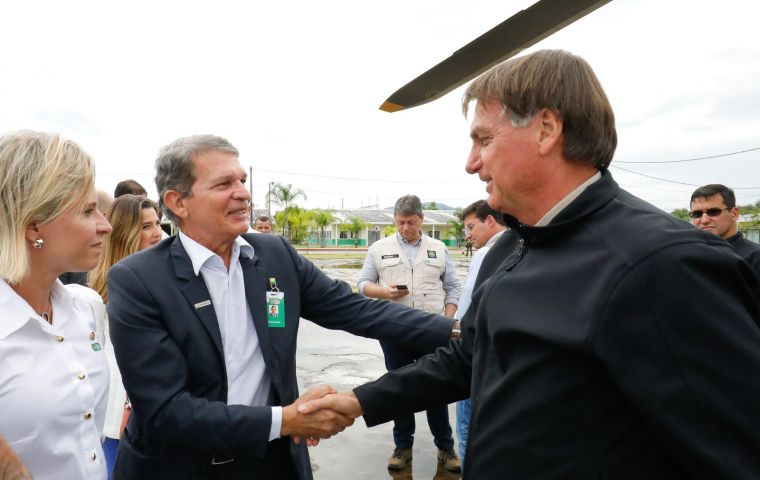MercoPress. South Atlantic News Agency
Bolsonaro sacks Petrobras chief, pending approval
 Pending a decision by the shareholders, Silva e Luna will remain in charge of Petrobras, unless he requests a leave
Pending a decision by the shareholders, Silva e Luna will remain in charge of Petrobras, unless he requests a leave The Brazilian Government Monday decided to sack Retired General Joaquim Silva e Luna as Petrobras CEO and appoint Economist Adriano Pires instead, after the price of fuel kept soaring, thus affecting President Jair Bolsonaro's chances of reelection.
The change needs to be confirmed by the general assembly of the state-owned company's shareholders. The next meeting is scheduled for April 13. Silva e Luna is the second Petrobras CEO to be fired by Bolsonaro. The change comes after the president criticized the adjustment of fuel prices.
According to the Ministry of Mines and Energy, if the decision is confirmed by the shareholders, Joaquim Silva e Luna will leave the chain of command of the oil company: his name does not appear in the composition planned for the Petrobras board of directors.
Pending a decision by the shareholders, Silva e Luna will remain in charge of Petrobras, unless he requests a leave.
The shareholders will also have to approve the name of businessman Rodolfo Landim to chair the board of directors. President of the football club Flamengo, Landim has not taken over the position because he is awaiting approval from the assembly.
Bolsonaro has criticized Petrobras for repeated readjustments in fuel prices. The president has even said that “if it worked out,” he would “punch the table” to force the state-
owned company to reduce prices.
Silva e Luna has reportedly said that the rigid governance structure set up in recent years would not give a new president free rein to change the pricing policy.
Silva e Luna was appointed in 2021 to replace Roberto Castello Branco. Silva e Luna's name was approved at an extraordinary general shareholders' meeting to join the Petrobras board of directors on April 12. Four days later, he was elected president of the company.
As the majority shareholder, the Federal Government holds the majority of seats on the board of directors of the state-owned company.
With more than 30 years of experience in the energy sector, Adriano Pires holds a PhD in Industrial Economics from the University of Paris XIII (1987), a Master's degree in Energy Planning from COPPE/UFRJ (1983), and a degree in Economics from the Federal University of Rio de Janeiro (1980).
He worked at the National Petroleum Agency (ANP) where he served as Advisor to the Director-General, Superintendent of Importation and Exportation of petroleum, its derivatives and natural gas, and Superintendent of Supply.
At the Federal University of Rio de Janeiro, he was a professor, researcher, and consultant for companies and international entities.
He is currently the director of the Brazilian Center for Infrastructure (CBIE), which he founded. The CBIE is a consulting firm specializing in intelligence, regulation, and strategic issues for the energy sector.
Recently, Pires has been acting as an informal consultant to the Ministry of Mines and Energy (MME) on the issue of high fuel prices. He defends the creation of a subsidy policy that would come from the direct Treasury and would last from 3 to 6 months for diesel and gas cylinders, due to the effects of the war between Ukraine and Russia. The economic team is against subsidies involving Treasury resources.
Pires believes that the solution for fuel prices is to create a stabilization fund.
After Monday's announcements, Petroleo Brasileiro SA shares fell as much as 4.1%, hitting session lows.
Luna, who has only been in the role for about a year, announced a hike in prices for both diesel and gasoline on March 10. Until then, Petrobras held prices stable for 57 days even as oil was trading well above US$ 100 a barrel after Russia invaded Ukraine.
Luna is an engineer by training who rose to the rank of four-star general and managed several national projects, including the construction of a mega-highway through the Amazon that began in the 1980s and took two decades to complete. He also ran the Itaipu hydroelectric dam during the Bolsonaro administration.




Top Comments
Disclaimer & comment rulesCommenting for this story is now closed.
If you have a Facebook account, become a fan and comment on our Facebook Page!